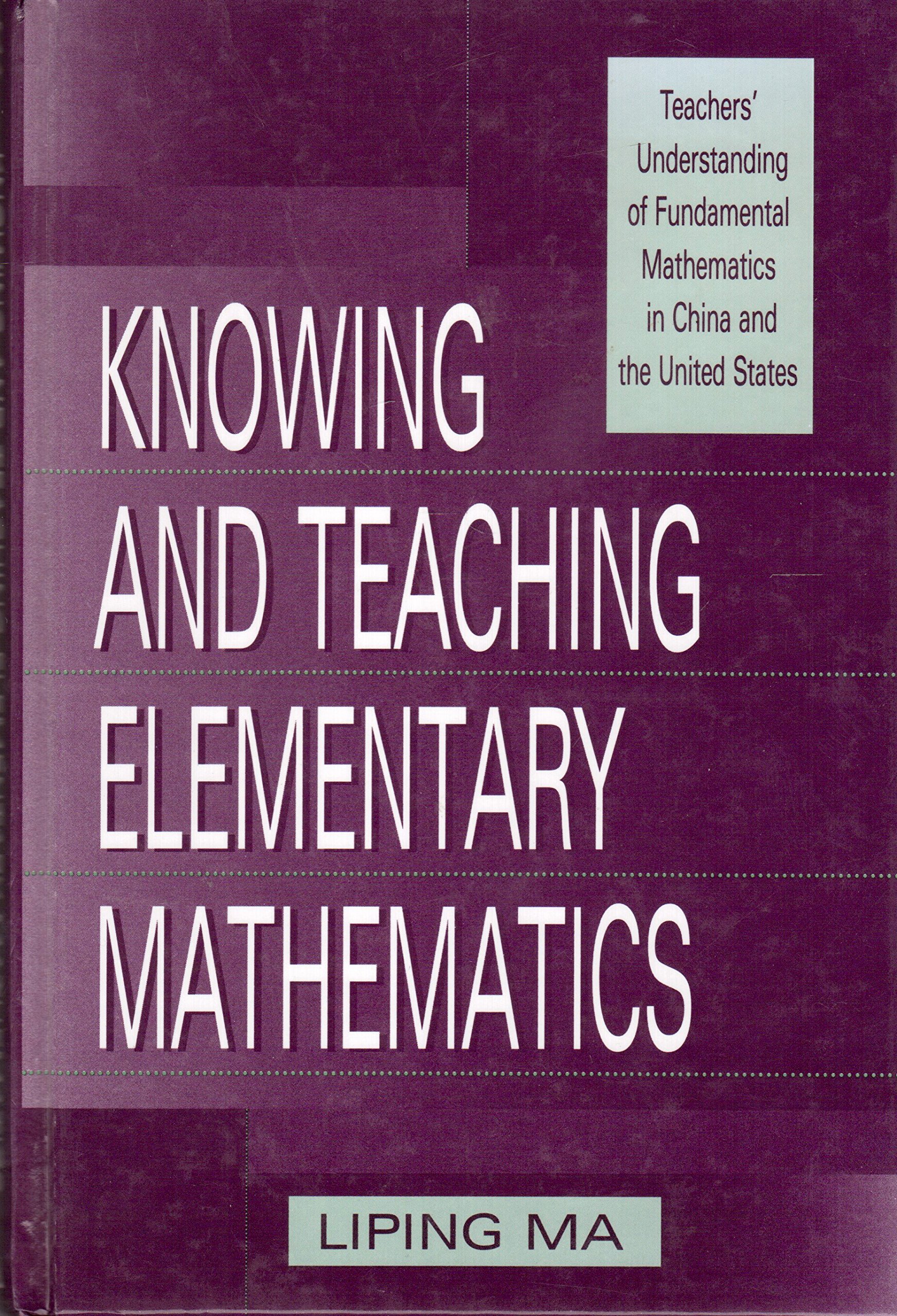Customer Services
Copyright © 2025 Desertcart Holdings Limited
Desert Online General Trading LLC
Dubai, United Arab Emirates


Knowing and Teaching Elementary Mathematics: Teachers' Understanding of Fundamental Mathematics in China and the United States (Studies in Mathematical Thinking and Learning Series)
N**H
Very informative and eye-opening
If you want to know how to teach your child math and investigate the various methods, this book is for you.
C**L
Absolutely a Must-Read for all Math Teachers and esp Homeschoolers
I purchased this book on a recommendation from a homeschooling forum - and I am absolutely thrilled that I did! It is a fascinating comparison between U.S. and Chinese Elementary teachers. It compares and contrasts their understanding of basic mathematics on many different levels using only 4 in-depth math questions that anybody can understand. (They're in-depth not because the mathematics is tough, but because the questions probe how thoroughly the teachers understand the math) Using subtraction with borrowing (i.e. 35-17), multiplying multidigit numbers (234 x 654) and dividing fractions, Liping Ma does an excellent job of testing how well the teachers of both countries understand and can explain these concepts to students.In the process of reading, my understanding of math was expanded and I will definately be teaching mathematics differently to my children. I will stop and focus on place value, making sure they understand what is going on thoroughly because now I know how foundational it is to the rest of math. I will watch my language and use more technically correct terms like "composing and decomposing a higher value unit" rather than the vague and misleading terms of "carrying" and "borrowing"This part wasn't directly discussed, but I was also struck by how the Chinese teachers utilize concepts in explaining arithmetic that in the U.S. you don't encounter until algebra. They will readily use the commutative law, associative law and distributive law in explaining arithmetic, and show their work step-by-step in a mathematically correct manner that in the U.S. we don't see done until algebra! So do we struggle with algebra because it's algebra? Or do we struggle with algebra because our basic arithmetic wasn't taught in a manner that was mathematical, but instead with haphazard explanations, our brains weren't taught to think thoroughly and completely through the math?I challenge ANY teacher of math (in a classroom or at home) to read this book and not deepen your understanding of the subject or have it change the way you view and teach mathematics!
B**E
Interesting reading to get inspired about teaching math
I can't remember if I read A Mathematician's Lament before or after this book. I read these years ago when I first began homeschooling because my child seemed to have high math aptitude, which I wanted to develop. I did very well in math all the way up through high school, completing calculus (AB). However, in interacting with my son, who had lots of questions, I learned that I was excellent at procedural math. I ended up choosing the Art of Problem Solving curriculum for him (before there was a Beast Academy), which was great. Anyway, I read this book to understand the different approaches to teaching elementary math. At that time, there was a craze for any non-American math (Singapore math, Korean math, Russian math, etc.). This book was easy to read and explained the way that math is taught (typically) in China. The idea that the teachers collaborated on different ways to approach elementary math problems was fascinating. I was inclined to think that it's not that difficult to show that 1+1=2. However, kids think in different ways. The author described how teachers in China would share how a student came up with a new approach to a problem. Encouraging creativity and problem solving like this is so important. I would definitely borrow it from a library or purchase it used. I still have it in my library because I think my son would find it interesting reading some day.
G**Y
Five Stars
Excellent resource for those teaching Singapore home educated/teacher
P**N
shows how important a profound understanding of fundamental mathematics is for teaching
Knowing and Teaching Elementary Mathematics is a book that compares and contrasts American and Chinese approaches to teaching elementary mathematics ie arithmetic and elementary geometry. The author argues that Chinese teachers have a more profound understanding of elementary mathematics than their American counterparts and provides pretty good evidence of this. While this aspect of the book is useful, the authors explanation of just what profound understanding of fundamental mathematics amounts to is much more useful. For example rather than using the technique of borrowing to subtract, the author recommends using something called decomposing a number which means understanding that, for example, the 2 in 23 is two tens so in 23 - 15 you move one ten from the 20 part and carry it over to the ones as a ten so 10 + 3 = 13 then you proceed to subtract 5 from 13. Of course the end result is the same but the student learns about the structure of numbers in the process ie that 23 = 2* 10 + 3 * 1. Anyway this is a very useful book. It is also a little bit embarrassing as I was not fully knowledgeable about some of the examples she used. For instance although I knew the process for computing (1 and 3/4 )/ (1/2) I couldn't for the life of me come up with a story to explain why you would want to do that. Anyway, this is a very eye opening book about the state of mathematics education in America and also just what it means to be proficient in elementary mathematics.
Trustpilot
1 month ago
2 months ago